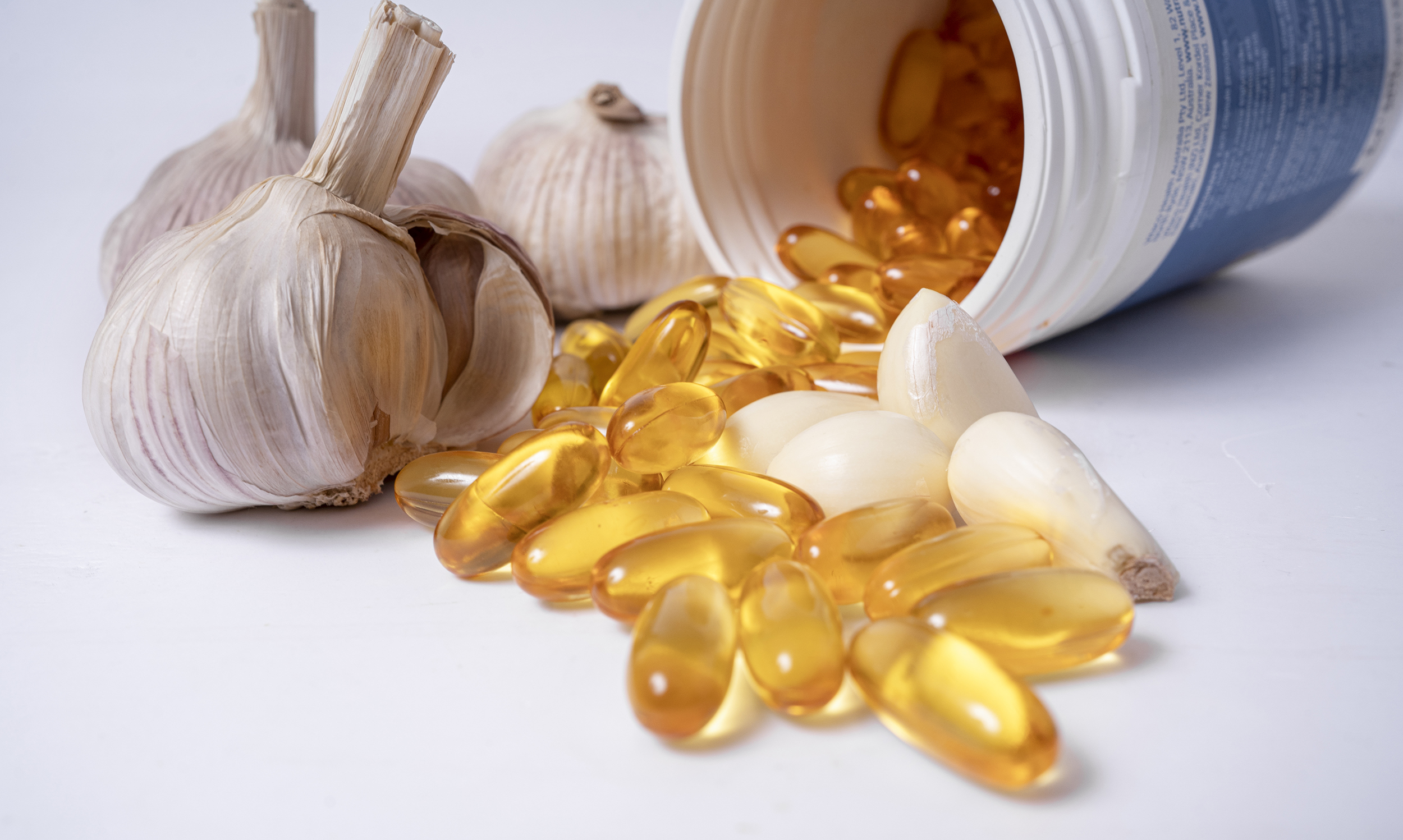Both fish oil and garlic have been studied for their potential benefits in managing cholesterol levels, but it is important to note that individual responses may vary.
Fish oil, which contains omega-3 fatty acids, has been shown to potentially reduce levels of triglycerides, a type of fat in the blood, and may have a modest effect on lowering LDL cholesterol levels. The American Heart Association recommends consuming about two servings of fatty fish per week or taking fish oil supplements to get the necessary omega-3 fatty acids.
Garlic, on the other hand, has been suggested to have a modest effect on reducing LDL cholesterol levels. It contains compounds that may help lower cholesterol and reduce the formation of blood clots. However, the evidence for garlic’s cholesterol-lowering effects is not as strong as for fish oil.
Ultimately, a healthy diet and lifestyle, including regular physical activity and avoiding unhealthy fats and processed foods, are the key factors in managing cholesterol. It is always best to consult with a healthcare professional for personalized advice on managing your cholesterol levels.
Know More About: which is better for cholesterol fish oil or garlic
Fish Oil vs Garlic: The Battle for Cholesterol Control
Maintaining healthy cholesterol levels is crucial for a strong, functioning cardiovascular system, and it often requires lifestyle modifications and dietary adjustments. Among the many natural remedies available, fish oil and garlic have garnered significant attention for their potential cholesterol-lowering abilities. But which of these two powerhouses reigns supreme in the battle against high cholesterol? Let’s dive into the scientific evidence to find out.
Fish oil, derived from fatty fish like salmon and mackerel, contains omega-3 fatty acids, notably eicosapentaenoic acid (EPA) and docosahexaenoic acid (DHA). These omega-3s have been shown to reduce triglyceride levels, decrease blood pressure, and potentially boost HDL (good) cholesterol levels. Despite the varying doses and quality of available fish oil supplements, numerous studies have consistently shown positive effects on lipid profiles.
On the other hand, garlic, a widely-used culinary ingredient, is also celebrated for its potential health benefits, including improving cholesterol levels. Allicin, a sulfur compound found in garlic, is thought to exert potent antioxidant and anti-inflammatory effects, aiding in the prevention of cholesterol synthesis. While consumption of raw garlic is paramount for reaping maximum benefits, garlic supplements are also available and widely used.
Numerous studies have demonstrated the efficacy of both fish oil and garlic in reducing Bad cholesterol (LDL) levels; however, fish oil consistently exhibits a stronger impact. A study conducted on hyperlipidemic patients found that fish oil supplementation led to a remarkable reduction in LDL cholesterol, whereas garlic did not demonstrate a significant difference compared to a control group. Furthermore, a meta-analysis of randomized controlled trials concluded that fish oil supplementation significantly reduced LDL cholesterol levels, emphasizing its ability to combat high cholesterol more effectively than garlic.
In terms of HDL cholesterol, the results are somewhat mixed. While fish oil tends to elevate levels of good cholesterol, garlic’s impact appears inconsistent. Some studies suggest that garlic supplementation may raise HDL cholesterol levels, while others report no significant change. Further research is needed to gain a more comprehensive understanding of garlic’s effects on HDL cholesterol.
Beyond cholesterol, other important factors such as inflammation and hypertension play pivotal roles in cardiovascular health. Fish oil has been recognized for its potent anti-inflammatory properties, reducing the risk of cardiovascular disease development. Garlic, too, exhibits anti-inflammatory effects, mediated by allicin and its derivatives. Additionally, both fish oil and garlic have been shown to aid in blood pressure regulation, promoting overall cardiovascular well-being.
While both fish oil and garlic have their merits in maintaining healthy cholesterol levels, fish oil emerges as the more robust contender. Its consistent ability to lower LDL cholesterol, reduce triglycerides, and promote HDL cholesterol makes it a powerful ally in the battle against high cholesterol. Furthermore, fish oil’s anti-inflammatory effects and blood pressure-regulating properties further solidify its position as a staple for cardiovascular health.
In conclusion, fish oil and garlic undoubtedly hold promise in combating high cholesterol and promoting overall cardiovascular wellness. However, the scientific evidence in favor of fish oil is more substantial, showcasing superior outcomes in terms of cholesterol control. Nevertheless, incorporating both fish oil and garlic into a heart-healthy diet may provide a synergistic effect, bolstering the benefits and potentially maximizing their impact on lipid profiles.
FAQs on which is better for cholesterol fish oil or garlic
1. Is fish oil effective in lowering cholesterol levels?
Yes, fish oil has been shown to reduce triglyceride levels and potentially improve cholesterol levels due to its omega-3 fatty acids content.
2. Can garlic help lower cholesterol?
Garlic has been found to have a modest effect on reducing total cholesterol levels, especially in individuals with high cholesterol or specific genetic factors.
3. Which is better for cholesterol, fish oil, or garlic?
There is no definitive answer as both fish oil and garlic can contribute positively to cholesterol management. It ultimately depends on individual preferences, underlying health conditions, and dietary restrictions.
4. Can fish oil supplements replace medication for high cholesterol?
Fish oil supplements might have a positive impact on cholesterol levels, but they cannot replace prescribed medication. It’s important to consult with a healthcare professional about the suitable treatment plan.
5. How do omega-3 fatty acids in fish oil affect cholesterol?
The omega-3 fatty acids found in fish oil can increase HDL (good) cholesterol levels while reducing triglyceride levels. This combination is beneficial for overall cardiovascular health.
6. Does consuming garlic have any side effects?
Garlic consumption is generally safe for most people, but it can cause digestive issues, allergic reactions, or interact with certain medications. Consulting a healthcare professional is advisable, especially for those with specific conditions or taking medications.
7. Can fish oil or garlic completely reverse high cholesterol?
While fish oil and garlic may contribute to improving cholesterol levels, they are not guaranteed to completely reverse high cholesterol. A comprehensive approach combining dietary changes, exercise, and potentially medication is often needed.
8. Are there any precautions to consider when taking fish oil supplements?
Fish oil supplements may interfere with blood-thinning medications or increase the risk of bleeding. Individuals with certain medical conditions, such as diabetes or a compromised immune system, should consult a doctor before starting fish oil supplements.
9. Can one rely solely on garlic to control cholesterol levels?
Garlic can be a part of a cholesterol-lowering diet, but it is unlikely to solely control cholesterol levels. A well-rounded approach, including a balanced diet, regular exercise, and potentially other interventions, may be necessary.
10. Can both fish oil and garlic be used together for cholesterol management?
Yes, incorporating both fish oil supplements and garlic into a cholesterol management plan might provide synergistic benefits. However, it is important to consult with a healthcare professional for individualized advice on using both simultaneously.

